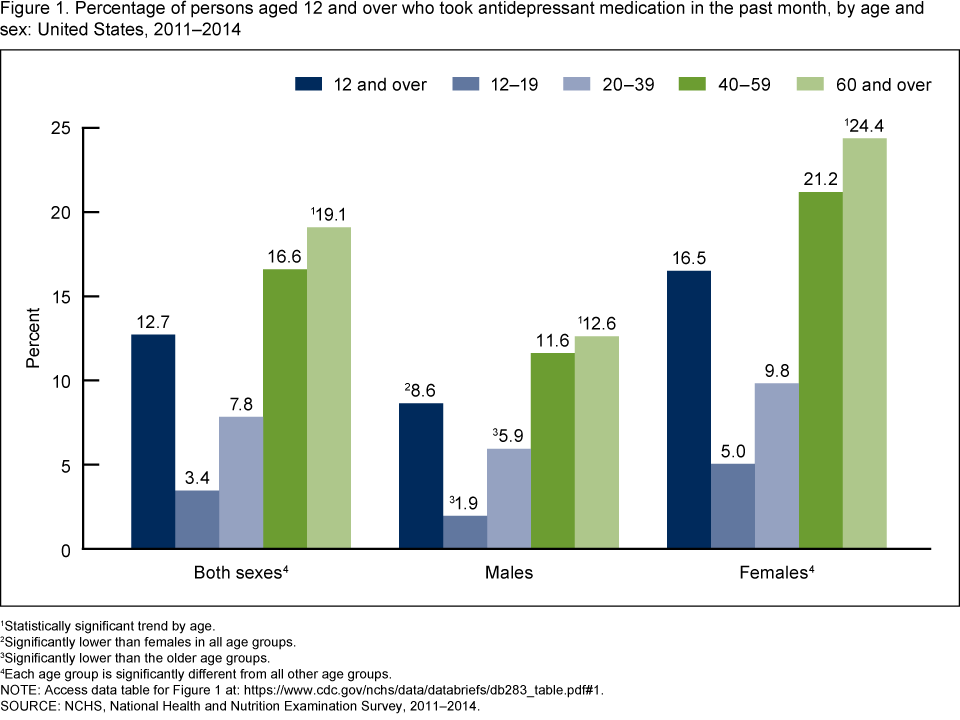Depression--with symptoms such as low-self worth, lack of concentration, fatigue, loss of appetite, insomnia and others--is a common mental disorder around the world. In fact, an estimated 300 million people suffer from mental illnesses globally. Described as an “unseen burden” by the World Health Organization (WHO), depression can become chronic and lead to significant impairments in an individual’s ability to carry out everyday activities and can lead to suicide. The United States is one of the most depressed countries in the world after China and India. In a given year 43.8 million adults, or 1 in 5, in the U.S. experience mental illness in a given year.
Antidepressants—known by brand names such as Zoloft, Celexa, Prozac—are commonly prescribed to treat depression and are some of the most popular drugs in the United States. Nearly 13% of people 12 years of age and older said they took an antidepressant in the last month according to a 2017 report from the National Center for Health Statistics. As you can see from the graph below, women are twice as likely as men to say they took antidepressants.
Figure 1. Percentage of persons aged 12 and over who took antidepressant medication in the past month, by age and sex: United States, 2011–2014

Many antidepressants come from a class of medications known as Selective Serotonin Reuptake Inhibitors or SSRIs. Unfortunately, there are many common side effects to using SSRIs including drowsiness, fatigue, sleep difficulties, weight gain, nervousness, dry mouth, blurred vision and more. Doctors recommend a slow weaning off of SSRIs because abruptly stopping can cause Antidepressant Discontinuation Syndrome which comes with its own set of side effects including spells, extreme restlessness, dizziness, fatigue, and aches and pains.
In China, where approximately 100 million people suffer from depression, doctors have been using the Chinese herbal formula Xiao Yao San (“Free and Easy Wanderer”) as a treatment for centuries. This formula contains eight commonly used herbs: Bupleurum root, Chinese angelica root, white peony root, poria, bighead atractylodes rhizome, roasted ginger, prepared licorice root, menthol and peppermin.
In a research article entitled Chinese Herbal Formula Xiao Yao San for Treatment of Depression: A Systematic Review of Randomized Controlled Trials (Evidence-Based Complementary and Alternative Medicine, Volume 2012, Article ID 931636), researchers set out to evaluate the beneficial and harmful effects of Xiao Yao San. What they found was that using prescriptions based on Xiao Yao San in the form of pills, powder and boiling the herbs may be beneficial to patients with depression.
In Chinese Medicine theory terms, Xiao Yao San may be soothing the liver, invigorating the spleen, nourishing the blood and clearing away the liver fire due to blood deficiency. Biochemically, this formula also reversed CIS-induced decreases in brain-derived neurotrophic factoroche and increases in tyroxine hydroxylase, and neurotrophin 3 in the frontal cortex, and the hippocampal CA subregion.
In comparing Xiao Yao San prescriptions alone, antidepressants along, and the combination of Xiao Yao San prescriptions and antidepressants, the researchers found that prescriptions may have the same effectiveness as antidepressants at the end point of treatment with fewer side effects. Combining Xiao Yao San with antidepressants actually showed significant beneficial effects—shorter onset time, symptom improvement with less adverse events—as compared to the results of those taking just antidepressants or just Xiao Yao San prescriptions.

Ready To Test The Power of Xiao Yao San?
At DAO Labs, we have designed Emotional Balance based on Xiao Yao San. This convenient, flavorful powder supplement is added to water to provide to balance anxiety and stress, mental tension, fatigue, irritability, and PMS emotions. Many people depend on Emotional Balance daily to prevent and manage stress.
Care Consideration: Just a reminder that the above information is not a substitute for medical care and is not a substitute for medical advice or recommendations from a healthcare provider. This information is not intended to treat, mitigate or cure any disease and has not been evaluated with the Food & Drug Administration. That said, we encourage you to connect with an Acupuncturist in your community to learn more about this and other Traditional Chinese Medicine options. If you’ve got questions about Chinese herbal medicine or getting started with an Acupuncturist, feel free to connect with us on hello@mydaolabs.com.













,_LAc_96x96.jpg?v=115415)



